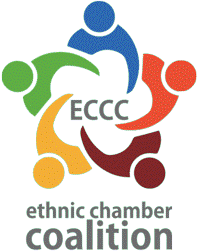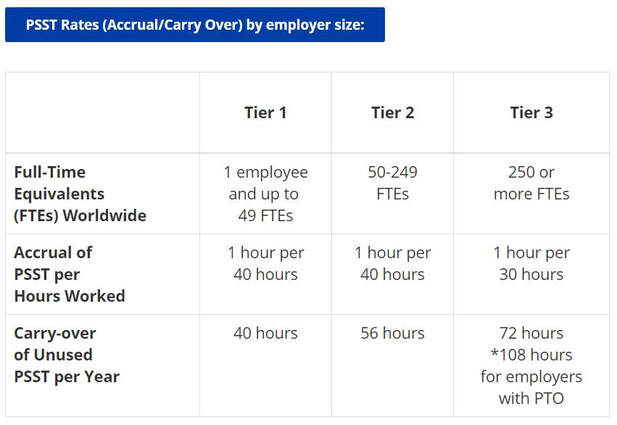Seattle's Paid Sick & Safe Time Ordinance (SMC 14.16) requires employers operating in Seattle to provide all employees with paid leave to care for themselves or a family member with a physical or mental health condition, medical appointment, or a critical safety issue.
Accrual rates for PSST are as follows:
Accrual rates for PSST are as follows:
Employees can use PSST as follows:
- To care for a personal or family member’s illness, injury or health condition, including preventative appointments
- To care for a personal or family or household member’s for a reason related to domestic violence, sexual assault, or stalking
- To care for a personal absence when a workplace, or child’s school/place of care, has been closed by order of a public official for health reasons
- Family member is defined as child of any age, spouse including registered domestic partners, parent and parent-in-law, sibling, grandparent, and grandchild
PSST Requirements Summary:
- Employee coverage: all employees working in Seattle (e.g. hourly and overtime exempt employees)
- Employer coverage: any employer with at least one employee
- Scope of Use and Permitted Uses: as detailed above
- Employer may not cap the total amount of accrued PSST an employee may use in a year
- Employer may impose a waiting period of up to 90 days from the start of employment, before an employee may use accrued PSST
- Employees can use PSST in the smallest increment in which compensation is tracked, not to exceed one hour
- Employers must pay normal hourly compensation, which includes lost commissions for hourly employees
- Employer verification of absence:
- Employer may ask for verification that PSST is for a covered use after absences of more than three consecutive work days
- Employer's requirements for verification may not result in an unreasonable burden or expense on the employee. If the employer does not offer health insurance, employer and employee must split the cost of obtaining verification
- PSST must be reinstated after a break in service of up to 12 months for the same employer
- Frontloading of PSST hours in advance of accrual is permitted, but employers must frontload based on a reasonable estimate of hours worked (adjusting the amount as necessary) and allow carry-over
- Cash-out is permitted at the end-of-year and at separation of employment. End-of-year cash-outs can only include PSST balances in excess of carry-over requirements; full cash-out is permitted at separation of employment
- Retaliation Protections:
- An employer may not discriminate or retaliate against an employee for good faith assertion of PSST rights.
- Employers may not require employees to find a replacement worker to cover the hours during which the employee is on PSST.
- Employers may not apply absence control policies to an employee’s use of PSST.
Notification Requirements for PSST:
Employers must provide notification of PSST hours every time that wages are paid, including:
- PSST Available
- PSST accrued since last notice
- PSST reduced (e.g. used, donated) since last notice
Employers shall provide each employee with written notice of the employer’s PSST policy. Employer’s policy and procedure shall include:
- The employee's right to paid sick and paid safe time under this Chapter 14.16;
- Whether the employer is using a year other than the calendar year for providing paid sick and paid safe time;
- The employer's tier size under this Chapter 14.16;
- The employer's rate of accrual and carry over of paid sick and paid safe time;
- The authorized purposes under which paid sick and paid safe time may be used;
- The manner of providing employees with notification of available paid sick and paid safe time each time wages are paid;
- The reasonable notice requirements for requesting use of paid sick and paid safe time;
- Prohibitions against retaliation for use of paid sick and paid safe time;
- If applicable, explanation of:
- Verification for use of paid sick and paid safe time for more than three consecutive days;
- Use of frontloaded paid sick and paid safe time;
- Universal paid leave policy;
- Shared paid sick and paid safe time program in which an employee may choose to donate paid sick and paid safe time to a co-worker;
Do you have this policy?


